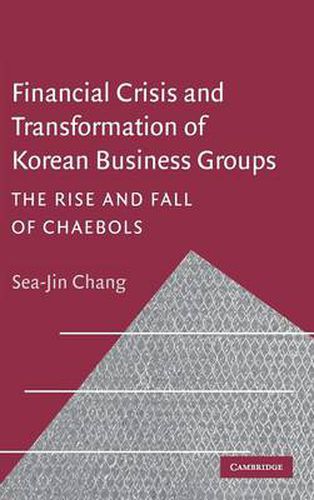Readings Newsletter
Become a Readings Member to make your shopping experience even easier.
Sign in or sign up for free!
You’re not far away from qualifying for FREE standard shipping within Australia
You’ve qualified for FREE standard shipping within Australia
The cart is loading…






Sea-Jin Chang argues that the Korean financial crisis of 1997 was due to the inertia of both the business groups known as chaebols and the Korean government which prevented adaptation to changing external environments. Once the Korean government stopped central economic planning and pursued economic liberalization in the 1980s, the transition created a void under which neither the government nor markets could monitor chaebols’ investment activities. The intricate web of cross-shareholding, debt guarantees, and vertical integration resulted in extensive cross-subsidization and kept chaebols from shedding unprofitable businesses. The government’s continued interventions in banks’ lending practices created ‘moral hazards’ for both chaebols and banks. This treatment demonstrates how the structure of chaebols later inhibited other adaptations and for all practical purposes became nearly dysfunctional. The book argues that restructuring of chaebols should focus on improving corporate governance systems. After such restructuring, the author predicts, chaebols will reemerge as stronger, more focused global players.
$9.00 standard shipping within Australia
FREE standard shipping within Australia for orders over $100.00
Express & International shipping calculated at checkout
Sea-Jin Chang argues that the Korean financial crisis of 1997 was due to the inertia of both the business groups known as chaebols and the Korean government which prevented adaptation to changing external environments. Once the Korean government stopped central economic planning and pursued economic liberalization in the 1980s, the transition created a void under which neither the government nor markets could monitor chaebols’ investment activities. The intricate web of cross-shareholding, debt guarantees, and vertical integration resulted in extensive cross-subsidization and kept chaebols from shedding unprofitable businesses. The government’s continued interventions in banks’ lending practices created ‘moral hazards’ for both chaebols and banks. This treatment demonstrates how the structure of chaebols later inhibited other adaptations and for all practical purposes became nearly dysfunctional. The book argues that restructuring of chaebols should focus on improving corporate governance systems. After such restructuring, the author predicts, chaebols will reemerge as stronger, more focused global players.